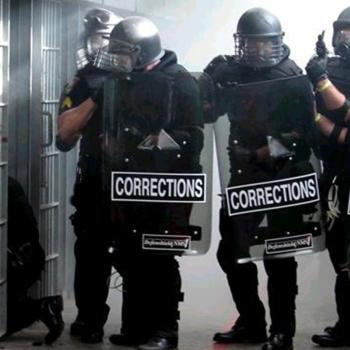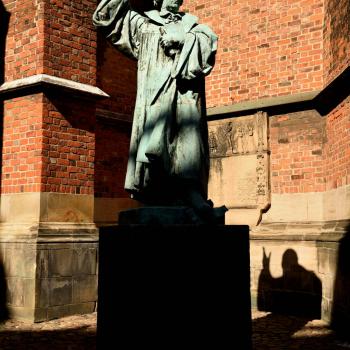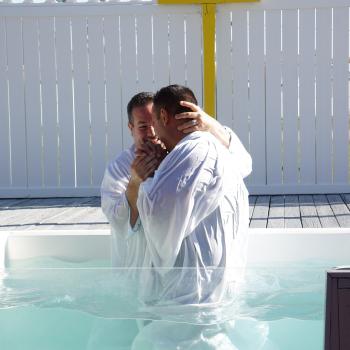After some delay (family and travel issues), I am happy to present the third of four parts of my interview with Father James Alison. Part I introduced Father Alison to readers while Part II was the first of the final three parts dealing with Father Alison’s views on matters of homosexuality and Catholicism. My questions are in italics. I have been mostly staying out of the conversation for now, but plan on presenting my own thoughts in a more systematic way once the series has run its course.
6. Much of the discussion in Catholic circles about homosexuality revolves around the distinction between homosexual persons and homosexual acts. The Church condemns the acts as disordered (and calls any orientation towards disordered acts disordered), but insists that homosexual persons are not, as such, disordered. What are your thoughts on this distinction? What is the relationship between persons, orientations, and acts?
This does seem to me somewhat of a Ptolemaic discussion in a Copernican universe. Of course there is a notional distinction between talking about what someone is, and talking about what someone does. The question is not “does the notional distinction exist?” but “what use is being made of the fact that such a distinction can be formulated?” When the distinction is made in the discussion of gay people to which you refer, it is subservient to a conviction brought in from elsewhere – that of the objectively disordered nature of the inclination.
Think of it this way. There is a distinction between left-handedness and the act of writing left-handedly. For most of us the distinction remains exactly that, and has no moral consequences. We would understand that a left-handed person forced to write right-handedly owing, say, to having their left arm in a plaster cast, or a right-handed person forced to write left-handedly for analogous reasons, would, with some difficulty, be able to learn to do so. These people would in some sense be acting “contra natura”. But the use of the hand appropriate to their handedness would be entirely unremarkable, and if we used words to describe it at all, they would be words like “typical” or “natural”. Now, imagine that, involved in a Catholic discussion, you find yourself addressing a left-handed person. You say: “Any left-handed writing you do is intrinsically wrong; and in fact the inclination we call left-handedness must be considered objectively disordered.” The only justification for using the distinctions in this way is if you have received, from quite other sources, the sure knowledge that right-handedness is normative to the human condition, anything else being some sort of defect from that norm, and yet you don’t want entirely to condemn the person who has a more or less strong tendency to left-handed writing.
No, it seems to me quite patent that here we have an unwieldy bid to fit a reality into an acceptable framework, rather than learning from reality how to adjust a now unreliable framework. Any left-handed person, faced with the above logic, would know that the one addressing them really does regard them as a defective right-handed person, rather than a normal left-handed person. Any insistence on the part of the one who is addressing them that they are not calling them “disordered” as a person would be seen to be the humbug that it is.
So the only real question is: is it true that being straight (or right-handed) is normative in such a way that knowledge about being gay (or about left-handedness) should principally be derived negatively from the normative reality? If it is not true, then of course you are left with a notional distinction between being gay (or left-handed), and acts typical to that way of being, but the distinction has no moral significance in itself. What will give the acts their moral value will be a range of other considerations to do with human flourishing.
7. Some time ago I engaged in a lengthy e-mail exchange with the editor-in-chief of Lifesitenews because one of their articles had claimed that it was the teaching of the Catholic Church that homosexuality was a psychological disorder. After much wrangling, I was successful in getting them to edit the article. It is not Catholic teaching that homosexuality is a psychological disorder. In fact, my reading of the Catechism is that the official stance on this question is one of agnosticism. We don’t know the causes of homosexuality. What do you think the Church’s position is on this question? What are your beliefs about the origins of homosexuality? What factors strike you as the most important? What are your thoughts about homosexuality that has roots in sexual trauma or other aspects of a broken past?
I’m so glad that I wasn’t involved in your discussion with Lifesitenews! To judge by what you say, I think that I would simultaneously agree and disagree with both of you. Personally I think that the current teaching of the Roman Congregations in this area is of unstable meaning. The Congregations both insist that the inclination itself must be considered objectively disordered, and yet fight shy of committing themselves to a sense in which this claim has incidence in reality. Well, either their claim means something, in which case it enters into the realm of that which can be studied and understood by analogy with other objective disorders, having as its backdrop a clear claim about the proper order by comparison with which it is some sort of defect. Or, on the other hand, the claim has no incidence in any reality that can be measured, and is simply the verbally necessary logical ground which the CDF must stake out if it wants to maintain that the acts flowing from the inclination are intrinsically evil. This would be a consequence of their knowing that in Catholic Theology, acts flowing from a neutral or positive inclination could not be intrinsically evil, but would be good or bad according to use. So, in the one case, the claim would be falsifiable by the human sciences, and in the other, we would be obliged to derive our understanding of what is from what is forbidden, or “can never be approved”, a voluntarist position smuggled in by the back door, and the claim would be something like a de facto defection from Catholic teaching concerning grace, nature, faith and reason as set out with admirable clarity by Pope Benedict in his Regensburg address.
Now a teaching of unstable meaning that induces confusion is not of Christ. So I am sympathetic to those who attempt to cash out the teaching by claiming that it does actually mean something straightforward rather than allowing it to sound as though it means something rather ominous without ever allowing what that actually is into the clear light of day. I guess that your interlocutor at Lifesitenews was trying to do the former by claiming that the Church teaches that the inclination is a psychological disorder (and anyone who listened to the Vatican officials attempting to interpret the 2005 document barring admission of gay men to the priesthood would have a hard time denying that at least those officials, who were never reprimanded publicly for their positions, regarded the inclination as some sort of psychological disorder).
I think that the Archbishop of Brussels, Mgr Léonard, was trying to do something similar when he claimed recently that being gay is analogous to being anorexic. We would all agree that anorexia is a pathology of desire, one that can appropriately be described as an objective disorder. The local press jumped on the Archbishop for producing this analogy, a little unfairly I thought. While I consider him to be entirely mistaken in his view, he should nevertheless at least be commended for attempting to treat the official position as if it were in the business of trying to say something true. For if that position means anything from which real decisions about life-choices, acts and so forth can be made, it means that being gay must be regarded as analogous to something like anorexia, and must not be regarded as analogous to something like left-handedness. (I take this latter to be a paradigm case of a regularly occurring non-pathological minority variant in the human condition). When someone makes a clear affirmation about something, the docile conscience can then say: “A truth claim is being made in an area which is available to study. Is it true?” By contrast with this, the refusal either to confirm or to deny that a truth claim is being made, while allowing a negative pall to hang over many people’s sense of identity, as if coming from God, suggests to me the presence of a spirit other than the Holy.
My own belief is that being gay is a regularly occurring non-pathological minority variant in the human condition, and that an appropriate analogy is left-handedness, which also, as it happens, used to be regarded as some sort of defect in a normatively right-handed humanity. I’ve arrived at this position having, as an educated amateur, followed the studies and arguments back and forth over many years, and notice that this position is tending to be confirmed massively the more that we know and see of gay people who are able to live their lives openly. I hope I would be open to any emerging evidence that my view was wrong, though I’m aware how easily any of us can become locked into convenient self-deceptions and self-reinforcing ideological cocoons. Like all other educated amateurs gathering what I can from disciplines in which I have no expertise, what I know about the aetiology of same-sex desire is regularly being updated as the field advances, and I’m sure that we are in the early days of scientific knowledge about such things.
As part of my personal history, I should say that I remember my own relief on realizing that not all searches for causality are helpful. Part of my motivation in the search for a cause of being gay earlier in my life was the need to find “something that has gone wrong that I can put right”, and it was good, spiritually fruitful, to discover that the question: “what went wrong in where I came from?” is actually not a useful one. More helpful is to ask: “how can I enrich where I’m going starting from where I am, however this has come about?” I wish I could find the reference, but I remember a quote from St Augustine, tired of nit-picking arguments about the finer details of Original Sin, insisting that “it’s not where we come from that is important, but where we are going” or words to that effect.
As to the Church’s “having a position” on the aetiology of same-sex desire, I can’t imagine it having one, or wanting to have one, other than that of being available to learning from what is true in whatever field that truth emerges. What I imagine the Church will want to develop, as it is able to take on board what we are learning to be true about gay and lesbian people, is some sense of “what is being gay or lesbian for?” A sense of the way that something that genuinely is has some sort of capacity to point up the glory of God by a flourishing that is appropriate to it. I take it that consideration of this is indispensible for us as Church, given our faith that our Creator and Redeemer are one, and that there is an organic link between the Creation and the New Creation.
As to the current “status quaestionis”, I’m pretty much convinced by the evidence of the last fifteen or twenty years of research which show that the biological configurations that will manifest in a person being gay or lesbian are in place pre-natally. Having spent time in the late eighties and early nineties of the last century flirting with “ex-gay” ministries and their literature, it now seems to me a mistake to think that sexual trauma, abuse, or any post-natal psychological factors are causative of a same-sex orientation, though I think that such things can indeed affect the way any of us receives into our lives, and are able to live out, that pre-natal configuration of our capacity for love.
8. What is your view of bisexuality? What are your beliefs about its origins? How is it related to homosexuality?
I find it useful to distinguish between bisexuality as orientation and bisexuality as observation of practice. Many people seem to use the term loosely to refer to people who, on the face of it, appear to be either straight or gay, and yet who have, at one time or other, engaged in the sexual practices typical of the other orientation. So, for instance, a person within an opposite-sex marriage or relationship either leaves that relationship for a same-sex relationship or is found to have been having same-sex relationships concurrently with the opposite sex relationship. While such people are clearly functional in bed with both sexes, I don’t think that this automatically counts as bisexuality, any more than do the same-sex experiences of straight prisoners, or sailors, for instance, while in enforced confinement from the opposite sex, and who revert to type the moment an opposite-sex partner becomes a possibility. As far as I can tell from more or less keeping abreast of the studies: entirely independently of all the factors which might lead to situational bisexual behaviour, there is a small minority of people who are genuinely bisexual by orientation, and who get scant comprehension from those of either of the more obvious orientations. From what I have read, there is a gender imbalance in this, with more women than men being bisexual. But here, as in all these fields, I am nothing more than a slightly informed amateur – and have no beliefs or knowledge at all about aetiology or how that relates to other orientations.
9. Would I be right to assume that you advocate for Church recognition of same-sex marriage? Do you see any value in maintaining that same-sex marriage and opposite-sex marriage are, in fact, two different kinds of relationships?
Well, let’s make some distinctions! I am greatly pleased when I see the Church, in its members, if not yet in its hierarchy, coming to recognise that there is no good reason to deprive same-sex couples of access to civil marriage. However, I think it is far from obvious how we, as Church, should celebrate these acts of union liturgically: whether in a rite that is similar or analogous to that for the sacrament of matrimony, or with something rather different. And I don’t think it will be obvious for some time.
As you might guess from what I’ve said previously, I’m not sure that this is a discussion that is even worth having until the basic parameters can be agreed upon. Those who are committed to the notion that the people about whom they are talking are indulging an objective disorder, are impenitent practitioners of grave sin, and thus would be seeking to sanctify something that can never be approved, are not useful conversation partners if we are in fact dealing with people who are acting appropriately in seeking a form of flourishing that is an entirely legitimate option given who they have found themselves to be. Once we’ve agreed that we can talk at all, then I would say that from my perspective, the appropriate liturgical shape by which we bless God for the gift of the love between two same-sex spouses, and beseech God’s blessing to incarnate itself in their lives for us as Church, is something for which we have little jurisprudence as yet! And the same is true for our understanding of the analogies and differences between the relationships of same-sex married couples, and those opposite-sex couples who choose to live out the sacrament of matrimony (with its concomitant implications of the “munus” of the “mater”). It is the protagonists of these relationships who will, by lives lived publicly over time, yield for us knowledge of what is of their essence. No sense trying to hurry what is necessarily going to be a process of learning over several generations.
What is certainly true is that no useful purpose is served by seeing these realities as in principle in rivalry with each other, as though same-sex marriage somehow cheapens opposite-sex marriage. Likewise, should it indeed turn out that marriage between two baptised persons of the same sex is not sacramental in exactly the same sense as opposite-sex marriage, then whatever form of sacramentality does turn out to be proper to same-sex couples would certainly not be “second best” to the sacrament of marriage. God’s summons to flourishing involves people being called in tailor-made ways, not forced to endure invidious comparisons. There are many mansions in God’s house, and he invites each of us to discover what is his plan for each one of us – we are called by name, not by category.
Brett Salkeld is a doctoral student in theology at Regis College in Toronto. He is a father of three (so far) and husband of one. He is the co-author of How Far Can We Go? A Catholic Guide to Sex and Dating and the author of Can Catholics Evangelicals Agree about Purgatory and the Last Judgment?
















